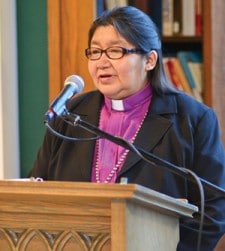The Anglican Church of Canada will soon have a new diocese. On July 6, 2013, the General Synod approved Resolution B001, a proposal that an area mission in Northern Ontario become an indigenous diocese—bringing to fruition plans that have been decades in development and which, according to Bishop Lydia Mamakwa, were born out of “the dream of the elders.” Mamakwa, elected as an area bishop in 2010, will become bishop of the new diocese, centred in Kingfisher Lake (500 km north of Thunder Bay). When it officially comes into being on June 4, 2014, it will be the result of “a lot of work, time and commitment and dedication,” says Mamakwa.

The full name of the new diocese, which will include 16 Treaty 9 communities, will be “The Indigenous Spiritual Ministry of Mishamikoweesh.” “Mishamikoweesh” (which means “Big Beaver House” in Ojibway) recalls the community, nearby to Kingfisher Lake, in which Dr. William Winter began his ministry in 1965. Winter was Keewatin’s first indigenous Archdeacon and the uncle of Mamakwa.
With its primarily indigenous identity, the new diocese will be a source of ministry responsive to the particular needs of First Nations communities—including the provision of services in Cree and Oji-Cree and community-based responses to addictions, violence and suicide. Mamakwa says, “There is a lot of work yet to be done in areas of healing: our people have undergone so much pain and despair—and yet they still go on with their ministry and with their faith. Our desire is that we will continue to proclaim the Gospel to our people, to everyone, whether it be in our native language or in other languages.”
The new diocese is also a tangible expression of the Church’s commitment to self-determination for indigenous Anglicans. According to Mamakwa, “The native diocese will be able to make its own decisions and be more independent and self-determining….Our desire is that our people would be equipped to do their work effectively wherever they may serve; we pray that under the guidance of the Holy Spirit we will fulfill our calling, in Jesus’ name.”
Bishop Michael Hawkins, Chair of the Council of the North, describes the way these new developments also “speak about the way in which, in the Council of the North…we are having to find ways in which our structures can be shaped by mission, as opposed to our mission being constrained by our structures.” This greater flexibility can, of course, be seen in the ways in which both Keewatin’s leadership as well as the surrounding dioceses have been willing to consider boundary changes, as well as sharing of authority.
Following the passing of the Resolution, delegates and guests from Keewatin sang “Praise God From Whom All Blessings Flow”—expressing the sense, articulated by Hawkins, that “self-determination is not fundamentally a political idea, for Christians, but a theological idea: it is grounded in Creation, and self-determination for indigenous Anglicans is grounded in an understanding of Creation as well as in the dignity and the rights of the people of the land.”
The creation of this new diocese will not add to the total number of dioceses or bishops since the portions of Keewatin not included in Mishamikoweesh are being realigned with other jurisdictions and Archbishop David Ashdown (currently bishop of Keewatin and metropolitan of Rupertsland) will retire on Dec. 31, 2014.
Interested in keeping up-to-date on news, opinion, events and resources from the Anglican Church of Canada? Sign up for our email alerts .
